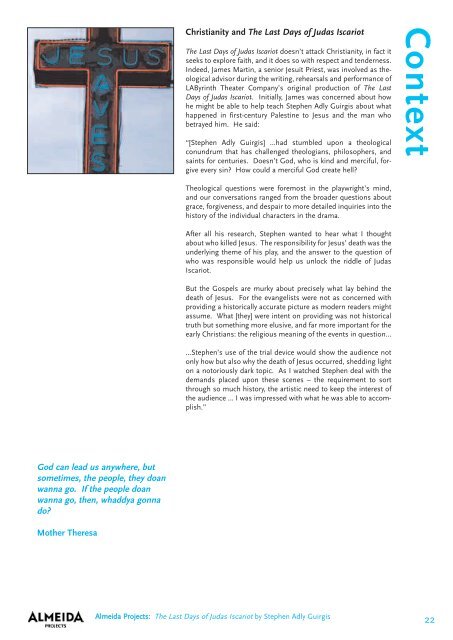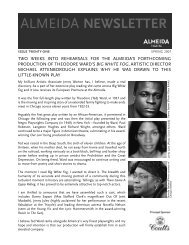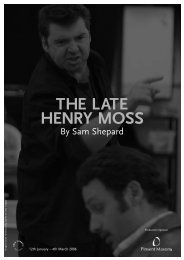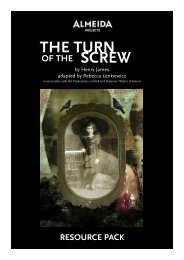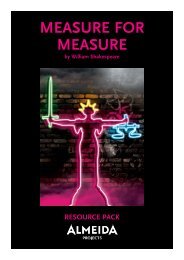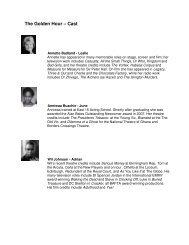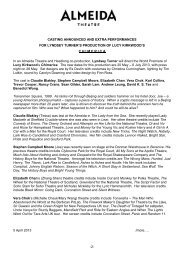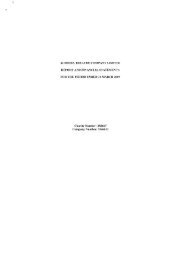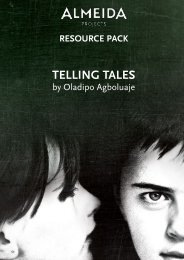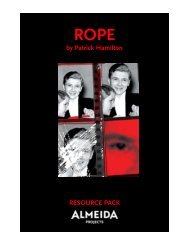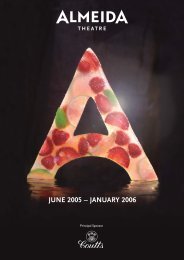The Last Days of Judas Iscariot - Almeida Theatre
The Last Days of Judas Iscariot - Almeida Theatre
The Last Days of Judas Iscariot - Almeida Theatre
Create successful ePaper yourself
Turn your PDF publications into a flip-book with our unique Google optimized e-Paper software.
Christianity and <strong>The</strong> <strong>Last</strong> <strong>Days</strong> <strong>of</strong> <strong>Judas</strong> <strong>Iscariot</strong><br />
<strong>The</strong> <strong>Last</strong> <strong>Days</strong> <strong>of</strong> <strong>Judas</strong> <strong>Iscariot</strong> doesn’t attack Christianity, in fact it<br />
seeks to explore faith, and it does so with respect and tenderness.<br />
Indeed, James Martin, a senior Jesuit Priest, was involved as theological<br />
advisor during the writing, rehearsals and performance <strong>of</strong><br />
LAByrinth <strong>The</strong>ater Company’s original production <strong>of</strong> <strong>The</strong> <strong>Last</strong><br />
<strong>Days</strong> <strong>of</strong> <strong>Judas</strong> <strong>Iscariot</strong>. Initially, James was concerned about how<br />
he might be able to help teach Stephen Adly Guirgis about what<br />
happened in first-century Palestine to Jesus and the man who<br />
betrayed him. He said:<br />
“[Stephen Adly Guirgis] …had stumbled upon a theological<br />
conundrum that has challenged theologians, philosophers, and<br />
saints for centuries. Doesn’t God, who is kind and merciful, forgive<br />
every sin How could a merciful God create hell<br />
Context<br />
<strong>The</strong>ological questions were foremost in the playwright’s mind,<br />
and our conversations ranged from the broader questions about<br />
grace, forgiveness, and despair to more detailed inquiries into the<br />
history <strong>of</strong> the individual characters in the drama.<br />
After all his research, Stephen wanted to hear what I thought<br />
about who killed Jesus. <strong>The</strong> responsibility for Jesus’ death was the<br />
underlying theme <strong>of</strong> his play, and the answer to the question <strong>of</strong><br />
who was responsible would help us unlock the riddle <strong>of</strong> <strong>Judas</strong><br />
<strong>Iscariot</strong>.<br />
But the Gospels are murky about precisely what lay behind the<br />
death <strong>of</strong> Jesus. For the evangelists were not as concerned with<br />
providing a historically accurate picture as modern readers might<br />
assume. What [they] were intent on providing was not historical<br />
truth but something more elusive, and far more important for the<br />
early Christians: the religious meaning <strong>of</strong> the events in question…<br />
…Stephen’s use <strong>of</strong> the trial device would show the audience not<br />
only how but also why the death <strong>of</strong> Jesus occurred, shedding light<br />
on a notoriously dark topic. As I watched Stephen deal with the<br />
demands placed upon these scenes – the requirement to sort<br />
through so much history, the artistic need to keep the interest <strong>of</strong><br />
the audience … I was impressed with what he was able to accomplish.”<br />
God can lead us anywhere, but<br />
sometimes, the people, they doan<br />
wanna go. If the people doan<br />
wanna go, then, whaddya gonna<br />
do<br />
Mother <strong>The</strong>resa<br />
<strong>Almeida</strong> Projects: <strong>The</strong> <strong>Last</strong> <strong>Days</strong> <strong>of</strong> <strong>Judas</strong> <strong>Iscariot</strong> by Stephen Adly Guirgis<br />
22


